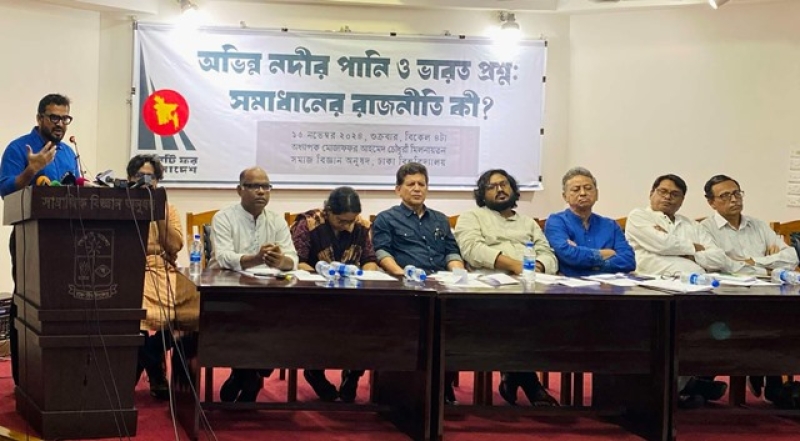- State mourning begins, state funeral for Khaleda Zia at 2 pm |
- Kamal Hossain: Khaleda Zia was ‘a patriot and democratic guardian' |
- High medicine prices threaten healthcare of poor communities |
- Curtain falls on a political giant as Khaleda Zia passes into history |
Urgency of resolving India-Bangladesh river dispute stressed

A seminar on Water of Common River and the India Question - The Politics of Resolution held at Dhaka University on Friday._11zon
Dhaka, Nov 15 - A seminar titled "Common River Water and the India Question: What is the Politics of Resolution?" delved into the longstanding India-Bangladesh river water dispute, which has persisted unresolved for over three decades. Held on Friday at Dhaka University’s Professor Muzaffar Ahmed Chowdhury Auditorium, the event brought together experts, academics, and political figures to discuss the dispute’s complexities and explore potential solutions.
BNP standing committee member Amir Khasru Mahmud Chowdhury highlighted the intertwined political and security concerns shaping India-Bangladesh relations. He called for a policy of mutual respect and non-interference. Chowdhury also emphasized the importance of aligning Bangladesh’s strategy with international water law and revitalizing the currently ineffective River Basin Commission to protect the nation’s river rights.
Former caretaker government adviser Dr. Hossain Zillur Rahman criticized what he described as a tendency to prioritize India’s demands over Bangladesh’s needs. He stressed the importance of balancing relationships with all neighbors while asserting Bangladesh’s interests. Negotiations must prioritize Bangladesh’s current and future requirements, rather than deferring to India’s dominant position, he argued, adding that achieving equity in water-sharing agreements is vital to securing long-term solutions.
Sheikh Rokon, General Secretary of Riverine Peoples, highlighted the historical roots of the problem, pointing out that water-sharing arrangements were neglected during the partition of the subcontinent. No permanent solution for river distribution was established, leading to unresolved disputes over rivers such as the Ganges and Teesta, he explained. Rokon urged comprehensive agreements on the Ganges, Meghna, and Brahmaputra rivers, arguing that negotiating individually for all 123 transboundary rivers could take centuries.
Mohammad Ejaz, Chairman of the River and Delta Research Center, accused India of “weaponizing” water flows to exert pressure on Bangladesh. He described how Bangladesh faces floods during the monsoon and drought-like conditions in the dry season, exacerbating its dependency on India. Citing the success of international river treaties, Ejaz called for cooperative negotiations, referencing the Ganges treaty as an example of progress.
The seminar, chaired by Manjur Moin of Unity for Bangladesh, featured diverse speakers, including Abdullah Kafi Ratan from the Communist Party of Bangladesh (CPB), writer and researcher Altaf Parvez, researcher Afifa Razzak Muna, and Dipti Dutta of Dhaka University’s Department of South Asian Studies. Discussions spanned geographical, historical, and political perspectives, reflecting the multifaceted nature of the dispute. - UNB

